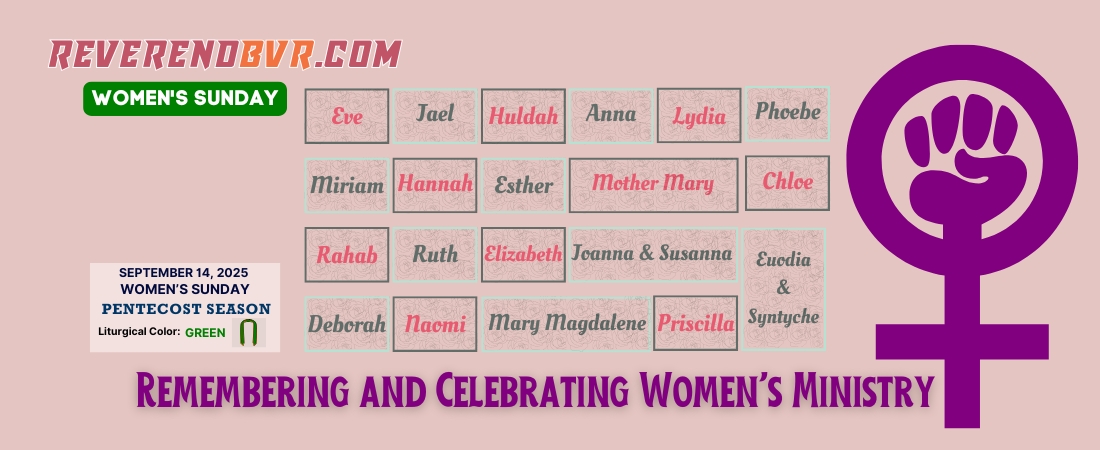On this Women’s Sunday, we remember and celebrate the vital yet often overlooked ministries of women throughout Scripture—from Deborah’s prophetic leadership to the faithful support of Jesus’ earliest followers. Their stories invite us to reimagine ministry as a gender-inclusive calling, essential to the unfolding of God’s redemptive work in the world.
Sermon for Women’s Sunday
Theme: Remembering and Celebrating Women’s Ministry
Date: Sunday, September 14, 2025
Textual References: Judges 4:4–16 | Philippians 4:1–7 | Luke 8:1–3 | Psalm 132.
Original Language Reflections (For deeper study, see Section 4 in the below sermon): Refer Table explaining Hebrew & Greek Words.
Website: www.reverendbvr.com
1.Introduction: The Forgotten Pillars
In the sacred story of redemption, women have always been present—not in the margins but often at the heart of God’s work. On this Women’s Sunday, we remember and celebrate their ministries—ministries often overlooked, undervalued, or overshadowed by historical patriarchy, yet vital in the unfolding drama of salvation. From Deborah’s prophetic leadership to the quiet generosity of Mary Magdalene, Joanna, and Susanna, and from Euodia and Syntyche’s gospel work to the promise of enduring covenantal faithfulness in Psalm 132, Scripture offers us a mosaic of women who shaped the faith we profess today.
I. Deborah: A Judge, Prophet, and Mother in Israel (Judges 4:4–16)
Deborah (דְּבוֹרָה, Dĕbôrah, meaning “bee“) is a singular figure in the Hebrew Bible. She held three distinct roles: prophetess (נְבִיאָה – nĕbîʾāh -feminine form of nābî i.e., prophet), judge, and national leader. At a time when Israel was oppressed by Jabin’s army, Deborah’s leadership emerges not as an anomaly but as a divine appointment. She judged Israel under the “Palm of Deborah” (Judg. 4:5), an indication of both geographical and symbolic authority—rooted, accessible, and wise.
Her theological significance lies in her prophetic call to Barak, who hesitates to act without her presence (v. 8), a narrative that subtly deconstructs assumptions of male-dominance in military or spiritual authority. Her words in verse 14, “Go! This is the day the LORD has given Sisera into your hands,” reflect not mere political strategy but deep theological conviction: Yahweh acts through obedience, and that obedience can be catalyzed by a woman.
Jael (Judg. 4:17–22), though not in our focal passage, complements Deborah by fulfilling the prophecy that “the LORD will deliver Sisera into the hands of a woman.” Thus, two women—one spiritual, one tactical—together secure Israel’s deliverance.
II. Women in the Early Church: Co-Laborers in the Gospel (Philippians 4:1–7)
In Paul’s heartfelt appeal to Euodia and Syntyche (v. 2), we hear not a correction of divisive women but an affirmation of their stature in ministry.
Paul writes that they “They have contended (συνήθλησαν, synēthlēsan) with me in the gospel.” (Phil. 4:3)This is not domestic support, but apostolic labor.
- συνήθλησαν (synēthlēsan) – compound verb from syn- (with) and athleō (to strive, compete), meaning “to struggle alongside as athletes.” This verb emphasizes active, sacrificial partnership.
- εὐαγγέλιον (euangelion) – the good news. These women were not peripheral helpers but core gospel co-workers.
- βιβλίῳ ζωῆς (bibliō zōēs) – “book of life” (v. 3), an eschatological register of the redeemed, affirming their eternal dignity.
Their disagreement is less about theology and more about unity. Paul’s appeal is an act of pastoral care, urging the community to uphold symphonía—harmonious unity. These women are not outliers; their names are written in the “book of life” (v. 3)—a status reserved for faithful servants of Christ (cf. Dan. 12:1, Rev. 3:5).
Thus, Paul sees women not only as recipients of the gospel but as active participants, strategists, and missionaries.
III. Women in Jesus’ Ministry: Silent Patrons and Bold Witnesses (Luke 8:1–3)
Luke highlights the patronage of women who supported Jesus “out of their own means” (v. 3). This seemingly minor detail holds profound theological implications. In Greco-Roman society, patronage was a structured system of influence and sustenance. That women—many with names and titles (Mary Magdalene, Joanna wife of Chuza (Herod’s steward) and Susanna)—would provide financially for a traveling male rabbi and his disciples reveals an inversion of societal norms.
These women, healed and liberated, respond with sacrificial support. Mary Magdalene’s deliverance from “seven demons” (v. 2) signifies a total transformation. Their presence continues at the crucifixion (Luke 23:49), burial (23:55), and resurrection (24:1–10). They are the first to proclaim the resurrection—apostles to the apostles.
Their role is not ancillary. It is essential. Their ministry is discipleship expressed in provision, presence, proclamation.
IV. Psalm 132: Covenant, Memory, and Legacy
While not overtly about women, Psalm 132 centers the theme of remembrance. “Lord, remember David…” (v. 1) is not merely a request; it’s a covenantal invocation. Memory in Scripture is active: to remember is to bring forth, to make present again.
Women throughout the biblical narrative have been bearers of memory—Hannah’s song (1 Sam. 2), Mary’s Magnificat (Luke 1), the weeping women of Jerusalem (Luke 23:28). The spiritual heritage passed through generations often flows through maternal lines—by nurture, worship, and testimony.
Thus, celebrating women’s ministry is part of God’s own remembrance. It is to honor covenant, to recognize the “horn” (v. 17) God raises through unexpected vessels.
V. Theological Reflections and Life Application
- Ministry is Gender-Inclusive by Divine Design: From Genesis (1:27) where both male and female are created in the image of God (tselem Elohim), to the Spirit poured out on “sons and daughters” in Joel 2:28 (fulfilled in Acts 2), ministry has never been a male-only vocation.
- Encouragement in the Face of Silence: Many women today serve in invisible roles—leading homes, shaping faith, discipling through love and example. The recognition of women in Scripture reminds us that God sees the unseen and honors the faithful.
- Community Support for Women’s Ministry: Paul calls the “true companion” in Philippians 4:3 to help these women. Churches today must intentionally support and celebrate women leaders, ensuring they are not hindered by structures rooted in outdated biases.
- Healing and Empowerment: Just as Jesus healed Mary Magdalene, so too does He continue to heal women from spiritual, emotional, and social brokenness—empowering them for witness and service.
2. Table detailing some of the prominent Women in the Bible and Their Ministry Roles
| S. No | Woman | Role/Ministry | Scripture Reference |
| 1 | Deborah | Judge, Prophet, Military Leader | Judges 4:4–16 |
| 2 | Jael | Deliverer of Israel (killed Sisera) | Judges 4:17–22 |
| 3 | Hannah | Prophetess, Prayer Warrior | 1 Samuel 1–2 |
| 4 | Ruth | Faithful Companion, Ancestor of David | Book of Ruth |
| 5 | Esther | Queen, Intercessor for her People | Book of Esther |
| 6 | Mary (Mother) | Theotokos (God-bearer), Model of Discipleship | Luke 1–2; John 19 |
| 7 | Mary Magdalene | Apostle to the Apostles | Luke 8:2; John 20:1–18 |
| 8 | Joanna & Susanna | Financial Supporters of Jesus’ Ministry | Luke 8:1–3 |
| 9 | Miriam | Prophetess, Worship Leader | Exodus 15:20 |
| 10 | Priscilla | Teacher of Apollos, Church Planter with Aquila | Acts 18:26; Romans 16:3 |
| 11 | Phoebe | Deacon, Benefactor, Letter Carrier of Romans | Romans 16:1–2 |
| 12 | Lydia | First European Convert, Church Host | Acts 16:14–15 |
| 13 | Euodia & Syntyche | Gospel Partners, Church Leaders | Philippians 4:2–3 |
| 14 | Rahab | Protector of Spies, Ancestor of Jesus | Joshua 2; Matthew 1:5 |
3. Conclusion: A Call to Remember and Reimagine
On this Women’s Sunday, may we not merely remember but also reimagine. Let us honor women’s roles not as exceptional but as essential, not as marginal but as foundational. May our churches be communities where every Deborah is heard, every Mary is welcomed, and every Phoebe is commissioned. In so doing, we mirror the kingdom of God, where “there is neither male nor female, for you are all one in Christ Jesus” (Galatians 3:28).
4. Learn Words from the Original Scriptures (For deeper understanding and meditation on today’s theme) :
| S.No | Term (Language) – Click on each term to view its lexical details | Meaning | Context |
| 1 | דְּבוֹרָה (Dĕbôrah) – Hebrew | “Bee” | Name of the prophetess and judge (Judges 4:4) |
| 2 | נְבִיאָה (nĕbîʾāh) – Hebrew | Prophetess (feminine form of נָבִיא – nābî) | Title for Deborah (Judges 4:4) |
| 3 | συνήθλησαν (synēthlēsan) – Greek | “Struggled together” / “Contended alongside” | Describes Euodia and Syntyche’s gospel labor (Philippians 4:3) |
| 4 | εὐαγγέλιον (euangelion) – Greek | “Good news” / Gospel | The work of Paul and the women co-laborers (Philippians 4:3) |
| 5 | βιβλίῳ ζωῆς (bibliō zōēs) – Greek | “Book of life” | The eschatological record of the redeemed (Philippians 4:3) |
| 6 | צֶלֶם אֱלֹהִים (tselem Elohim) – Hebrew | “Image of God” | The divine image shared by male and female (Genesis 1:27) |
| 7 | רוּחַ (ruach) – Hebrew | “Spirit / Breath / Wind” | The Holy Spirit poured out on “sons and daughters” (Joel 2:28; Acts 2) |
| 8 | συμφωνία (symphonía) – Greek | “Harmony / Agreement” | Paul’s call for unity (Philippians 4:3, implied through pastoral tone) |
5.Bibliography
- Bauckham, Richard. Gospel Women: Studies of the Named Women in the Gospels. Eerdmans, 2002.
- Schüssler Fiorenza, Elisabeth. In Memory of Her: A Feminist Theological Reconstruction of Christian Origins. Crossroad, 1983.
- Keener, Craig S. Paul, Women & Wives: Marriage and Women’s Ministry in the Letters of Paul. Hendrickson Publishers, 1992.
- Meyers, Carol. Rediscovering Eve: Ancient Israelite Women in Context. Oxford University Press, 2013.
- Nolland, John. Luke 1–9:20. Word Biblical Commentary, 1989.
6.Closing Prayer
Gracious God, You who called Deborah to lead, Mary to bear, Phoebe to serve, and Lydia to host,
We give you thanks for the countless women who have built your church.
May we honor their witness, empower their successors, and live in the fullness of your vision for your people.
Give strength to those who feel forgotten, hope to those still struggling for voice, and joy to those who serve in your name.
Through Jesus Christ, the Risen Lord, who uplifted the lowly and exalted the faithful. Amen.
© 2025 ReverendBVR.com | High-Academic Sermon Series, 2025.
Content licensed under Creative Commons Attribution-NonCommercial-NoDerivatives 4.0 International (CC BY-NC-ND 4.0). You are free to share — copy and redistribute the material in any medium or format with proper attribution. No commercial use or modifications allowed without explicit permission.
For further sermons and biblical reflections, please visit 🌐 www.reverendbvr.com/sermons

